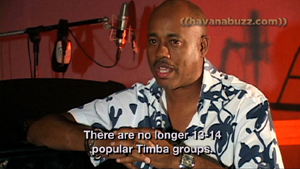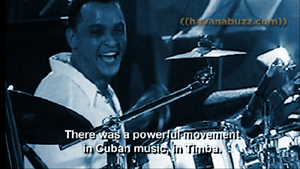Lo Nuevo[hide]
Musicos: Rafael Paseiro Monzón
Musicos: Dennis Nicles Cobas
Musicos: Jiovanni Cofiño Sánchez
Musicos: Yasser Morejón Pino
Fotos: Tom Ehrlich : 2024 Monterey Jazz, P...
Resenas: Vacilón Santiaguero (Circle 9 ...
Staff: Bill Tilford
Fotos: Tom Ehrlich : 2024 Monterey Jazz, P...
Fotos: Tom Ehrlich : 2024 Monterey Jazz Fe...
Fotos: Tom Ehrlich : testing 123
Grupos: Pupy y los que S... : Discography - 1995- F...
Reportes: From The St... : Cubadisco 2...
Reportes: From The St... : Jazz Plaza ...
Fotos: Tom Ehrlich : Irakere 50th Annivers...
Fotos Del Día [hide]
Michelle White - Animals of Cuban Music
 all images in this article courtesy of havanabuzz.com
all images in this article courtesy of havanabuzz.com
 "Animals of Cuban Music" is Jen Paz' second documentary about the state of the contemporary dance music scene in Cuba. Her first film "¡Popular!" followed La Charanga Habanera during what might be called the end of their pure timba period, when they were hugely popular on the Island following the release of the CD "Soy cubano, soy popular". As indicated by the subtitle: "salsa vs reggaeton", "Animals" presents the situation in Havana after the reggaeton explosion that had been building in Cuba for years, but was slowed by policies that discouraged reggaeton.
"Animals of Cuban Music" is Jen Paz' second documentary about the state of the contemporary dance music scene in Cuba. Her first film "¡Popular!" followed La Charanga Habanera during what might be called the end of their pure timba period, when they were hugely popular on the Island following the release of the CD "Soy cubano, soy popular". As indicated by the subtitle: "salsa vs reggaeton", "Animals" presents the situation in Havana after the reggaeton explosion that had been building in Cuba for years, but was slowed by policies that discouraged reggaeton.
 The root of the polemic is the competition for fans and for the limited concert venues in Cuba, particularly in Havana, which is the heart of timba and reggaeton scene. The timba artists that were on top in the late 90s and early 2000s are now finding themselves with half-full concerts while young Cubans are packing the reggaeton concerts, even paying 100 CUC for a ticket to the Clan 537 reunion concert at the height of the hysteria. On the other hand the reggaetoneros feel that they are still discriminated against and are not accepted by the establishment because reggaeton is not a Cuban music genre and because many of them have no music training in a country that prides itself on the quality of education provided at the conservatories.
The root of the polemic is the competition for fans and for the limited concert venues in Cuba, particularly in Havana, which is the heart of timba and reggaeton scene. The timba artists that were on top in the late 90s and early 2000s are now finding themselves with half-full concerts while young Cubans are packing the reggaeton concerts, even paying 100 CUC for a ticket to the Clan 537 reunion concert at the height of the hysteria. On the other hand the reggaetoneros feel that they are still discriminated against and are not accepted by the establishment because reggaeton is not a Cuban music genre and because many of them have no music training in a country that prides itself on the quality of education provided at the conservatories.
 Paz has no agenda and takes no sides. She lets the musicians and the music sequences tell the story themselves, interspersing brief interviews with the timba and reggaeton artists with extensive concert footage. The list of artists is an impressive who's who from both genres: Timba - Los Van Van, El Tosco, La Charanga Habanera, Manolito y Su Trabuco, Pupy y Los Que Son Son, Bamboleo, Paulo FG. Reggaeton - Gente D'Zona, Clan 537, Insurrecto, El Micha and Yulién Oviedo & MC Blad.
Paz has no agenda and takes no sides. She lets the musicians and the music sequences tell the story themselves, interspersing brief interviews with the timba and reggaeton artists with extensive concert footage. The list of artists is an impressive who's who from both genres: Timba - Los Van Van, El Tosco, La Charanga Habanera, Manolito y Su Trabuco, Pupy y Los Que Son Son, Bamboleo, Paulo FG. Reggaeton - Gente D'Zona, Clan 537, Insurrecto, El Micha and Yulién Oviedo & MC Blad.
 Music fans will appreciate the long concert sequences, primarily with Gente D'Zona, Clan 537, La Charanga Habanera, Manolito y Su Trabuco, Bamboleo and Yulién Oviedo y MC Blad. Amateur anthropologists will enjoy the audience shots, which clearly show that the timba audiences have a much larger percentage of tourists than the reggaeton concerts, which have an overwhelmingly Cuban audience, providing a candid glimpse of a world that few tourist see when they visit Cuba.
Music fans will appreciate the long concert sequences, primarily with Gente D'Zona, Clan 537, La Charanga Habanera, Manolito y Su Trabuco, Bamboleo and Yulién Oviedo y MC Blad. Amateur anthropologists will enjoy the audience shots, which clearly show that the timba audiences have a much larger percentage of tourists than the reggaeton concerts, which have an overwhelmingly Cuban audience, providing a candid glimpse of a world that few tourist see when they visit Cuba.
 One of the trends captured in the film is the move towards timbaton, a mix of timba with reggaeton. As the reggaeton craze continues more and more timba groups are collaborating with the reggaeton bands. Interestingly it's a mutually beneficial arrangement. It keeps the timba groups in touch with the younger audience but it also provides the reggaetoneros with an opportunity to record, as they have a hard time getting record deals with the Cuban record companies and are forced to finance their own recordings.
One of the trends captured in the film is the move towards timbaton, a mix of timba with reggaeton. As the reggaeton craze continues more and more timba groups are collaborating with the reggaeton bands. Interestingly it's a mutually beneficial arrangement. It keeps the timba groups in touch with the younger audience but it also provides the reggaetoneros with an opportunity to record, as they have a hard time getting record deals with the Cuban record companies and are forced to finance their own recordings.
 The documentary also provides fans some interesting behind-the- scenes footage such as backstage at concerts as well as strategy sessions for planning concerts. It also captures a couple of very special moments on video for fans. No one who is in touch with Cuban music has missed the mega-hit "El Animal" by Gente D'Zona. Paz was there in the studio when the song was in the
The documentary also provides fans some interesting behind-the- scenes footage such as backstage at concerts as well as strategy sessions for planning concerts. It also captures a couple of very special moments on video for fans. No one who is in touch with Cuban music has missed the mega-hit "El Animal" by Gente D'Zona. Paz was there in the studio when the song was in the
early recording stages. She also caught Yulién Oviedo working on his reggeaton version of the Los Van Van classic "Sandunguera".
 Jennifer Paz has a talent for finding and presenting what's hot right now. She has her finger on the pulse of Havana, and her films capture these moments in time for posterity. She does it without trying to impose her own opinions and interpretations, giving an unembellished, direct look at exactly what is happening and leaves it to the audience to draw their own conclusions and make their own valuations. This is an invaluable service to fans, cubanophiles and musicologists alike. No matter the outcome of the salsa vs. reggaeton competition, no matter who the Animals may be in 5 or 10 years, we now have a snapshot of Havana as it was at this time.
Jennifer Paz has a talent for finding and presenting what's hot right now. She has her finger on the pulse of Havana, and her films capture these moments in time for posterity. She does it without trying to impose her own opinions and interpretations, giving an unembellished, direct look at exactly what is happening and leaves it to the audience to draw their own conclusions and make their own valuations. This is an invaluable service to fans, cubanophiles and musicologists alike. No matter the outcome of the salsa vs. reggaeton competition, no matter who the Animals may be in 5 or 10 years, we now have a snapshot of Havana as it was at this time.
 Animals of Cuban Music is 70 minutes of Cuban music today presented with excellent video and audio quality.
Animals of Cuban Music is 70 minutes of Cuban music today presented with excellent video and audio quality.



















